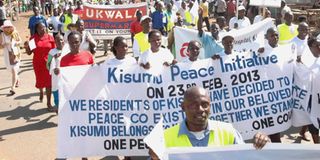Election rules need political goodwill of all

Kisumu residents in a procession to call for avoidance of post-election violence in 2013.
The aborted Election Campaign Financing (Amendment) Bill 2020 was meant to change the 2013 law. That change was to have been in place during the 2017 General Election and subsequent by-elections but was not.
The object of the Act was to give effect to Article 88(4) (i) of the Constitution; make provisions enabling the Independent Electoral and Boundaries Commission (IEBC) to regulate the amount of money that may be spent by or on behalf of a candidate or a political party in respect of an election or a referendum; promote transparency and accountability in election campaign financing; and require political parties and candidates to report campaign financing in a structured manner.
The basic operational structures for political parties has remained a grey area of concern since the governance and management of the outfits shifted from the Registrar of Societies to the Office of the Registrar of Political Parties (ORPP) with the enactment of the Political Parties Act 2011.
Before, parties did not have a legal personality or perpetual succession but basically belonged to individuals with a few persons forming them as conduits of socioeconomic trade for financial gains. Now, the Political Parties Act provides a legal framework for their registration, regulation and funding.
The Act established the ORPP, to oversee, implement and enforce the law. Since its 2011 inception, most parties and politicians have, by and large, become untenable and resistant to the rule of law and flout poll regulations at will. Disobeying and violating rules and embracing laws selectively is regressive and abuse of the sovereignty of the people and the oversight and enforcement agencies.
Change of guard
A change of guard at the IEBC every five years is not the panacea. The commission needs enhanced professionalism, ethics, integrity and an enabling environment of trust for optimum service delivery. This can be largely achieved by nurturing a strong working and reporting foundation between political parties, candidates and IEBC, guided by law.
There are more than 70 duly registered political parties, mostly dormant and resurfacing only months to the elections. Most of them lack a formal structure and rarely participate in strengthening themselves through grassroots’ organisation and recruitment, civic education on party manifestos, constitutions and the general election rules. Some have neither physical offices nor staff.
A few that benefit from the political party’s exchequer fund and membership subscriptions have scanty records of usage of the funds. The methodology of allocating the funds and formula of sharing them has been a bone of contention.
The bill meant well and was good for strengthening internal management and administration of political parties and candidates and fostering a level playing ground with transparency and accountability, thus addressing perennial election hitches.





